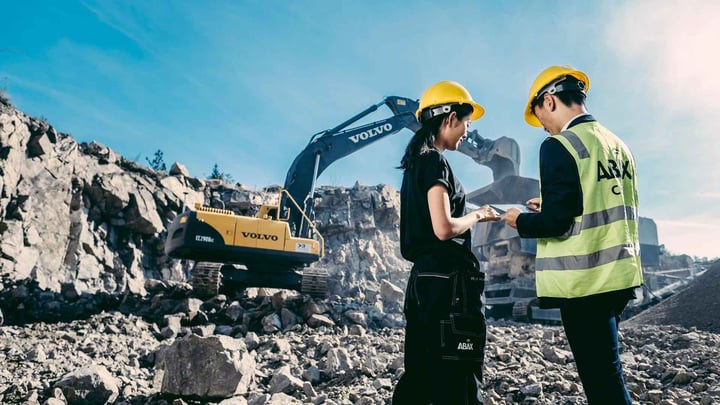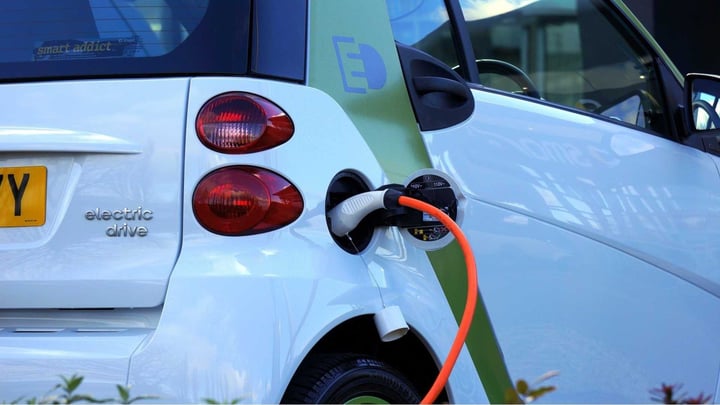Three-quarters (74 per cent) of UK fleets have adopted more digital solutions since the start of the COVID-19 pandemic, new research has revealed.
ARCHIVE FOR THE ‘service-innovation-and-design’ CATEGORY
Jan 14, 2022 • Fleet Technology • News • fleet management • Sustainability • Webfleet Solutions • Service Innovation and Design • EMEA
Three-quarters (74 per cent) of UK fleets have adopted more digital solutions since the start of the COVID-19 pandemic, new research has revealed.
A pan-European study conducted by Webfleet Solutions among 1,050 fleet decision-makers found that in the UK, smaller fleets of up to 50 vehicles led the charge, accounting for 80 per cent of the tech adopters.
SME BUSINESSES HAVE RECOGNIZED THE VITAL ROLE THAT TECHNOLOGY CAN PLAY IN OVERCOMING THE FINANCIAL AND LOGISTICAL CHALLENGES
Electronic signature tech (60 per cent) topped the list of the new digital solutions, followed by mobile apps (50 per cent) and digital document systems, such as paperless invoicing (44 per cent). In every case, the uptick in digitisation was found to have helped their businesses deal with the pandemic.
“COVID-19 continues to have a dramatic impact on the way we live and work, making operational flexibility, smart customer interactions, risk management and cost control more important than ever,” said Beverley Wise, Sales Director UK and Ireland, Webfleet Solutions.
“SME businesses, in particular, have had the agility to respond quickly to the ever-changing commercial landscape and have recognised the vital role that technology can play in overcoming the financial and logistical challenges – improving the efficient flow of information, supporting remote working and minimising person-to-person interactions.”
Indeed, the drive to increase efficiency was found to be top reason for UK fleets adopting more digital solutions, cited by more than half (55 per cent) of those surveyed. This was closely followed by efforts to reduce the spread of infection (51 per cent) and a continued commitment to sustainability (49 per cent).
Of those that haven’t adopted more digital solutions, 28 per cent cited cost as a barrier, 28 per cent said they had enough in place, while 22 per cent said they lacked the time or resources to implement new systems.
The Netherlands led the digitisation trend with 85 per cent adopting new digital solutions, followed by Italy and Spain (both 77 per cent).
For an overview of the findings, download the infographic here.
Further Reading:
- Read more about Digital Transformation @ www.fieldservicenews.com/service-innovation-and-design
- Read more about Fleet Technology @ www.fieldservicenews.com/fleet-technology
- Learn more about Webfleet Solutions @ www.webfleet.com
- Read more about Webfleet Solutions on FSN @ www.fieldservicenews.com/webfleet-solutions
- Follow WebFleet Solutions on Twitter @ twitter.com/Webfleetnews
Jan 12, 2022 • News • construction • Volvo Construction • Sustainability • ABAX • Service Innovation and Design • EMEA
The construction sector accounts for a significant amount of CO2 emissions worldwide, and is still far behind in the green transition.
The construction sector accounts for a significant amount of CO2 emissions worldwide, and is still far behind in the green transition. With all Volvo machines now available in ABAX Smart Connect, the digitalisation of the industry can accelerate and help reduce climate emissions - using technology that is already installed and ready for use.
CHEAPER SOLUTIONS OVER SUSTAINABLE
A new report conducted by Ramirent* in Sweden shows that cheap alternatives are often chosen in favour of sustainable solutions, even though the cheap alternatives rarely prove to be cost-saving. With the right sustainability measures, which can be easily implemented, climate emissions from the construction industry can be drastically reduced.
TOP FOUR LEADING HEAVY EQUIPMENT MANUFACTURES AVAILABLE
ABAX is a telematics company that has minimised the digital threshold for the construction industry. With ABAX Smart Connect, they have made it easier for fleet owners to be aware of their emissions.
The top leading manufacturers** such as Catepillar, Hitachi and John Deere are already connected to ABAX Smart Connect. When Volvo now joins, the service will be available for a significant number of machine fleets worldwide. Through ABAX Smart Connect, construction companies receive ongoing status updates on their machines. In practice, this means greater control of unnecessary operating and service costs, and a daily status update on consumption and compilation of CO2 footprints. The technology is already installed in all Volvo machines, and the only thing required to use the digital tool is a connection to ABAX Smart Connect.
Volvo is a significant supplier of machines to the Scandinavian market. The opportunity to be able to connect to technology that is already installed in Volvo's machines will enable major gains for both the environment and costs. We must all take responsibility and take advantage of the development opportunities that exist, not least in an industry with a major impact on society. We want to inspire others in the industry to make a difference and expand their digital services, says Paul Walsh, CTO of ABAX.
According to the Paris Agreement, today's emissions of greenhouse gases will be reduced by 40 % by 2030. Emissions from the construction industry have a direct impact on how all of the individual countries will contribute to the common goal for the EU. A prominent method of improvement is digitisation.
Further Reading:
- Read more about Service Innovation and Design @ www.fieldservicenews.com/service-innovation-and-design
- Read more about Sustainability on Field Service News @ www.fieldservicenews.com/automation
- Read more about Volvo CE on Field Service News @ www.fieldservicenews.com/topcon
- Find out more more about Volvo CE @ www.volvoce.com
- Learn more about ABAX @ www.abax.com
- Follow ABAX on Twitter @ twitter.com/ABAXUK
Jan 11, 2022 • News • Electric Vehicles • fleet management • Sustainability • UK • Service Innovation and Design • EMEA • VIMCAR
A new report from Vimcar, the fleet management provider for SMEs, reveals that the majority of petrol and diesel fleet cars on the roads in the UK and Europe could be switched to electric vehicles.
A new report from Vimcar, the fleet management provider for SMEs, reveals that the majority of petrol and diesel fleet cars on the roads in the UK and Europe could be switched to electric vehicles.From analysis of over 67,000 company fleet vehicles, the findings take into account the average distance fleet vehicles are travelling, compared to the mileage range on electric vehicles.
87% of companies said that the mileage range of electric vehicles is the main concern when considering whether or not they should make the switch to electric. However, the data suggests that mileage range is only an imagined obstacle in fleet electrification and that despite popular beliefs, most companies are in fact able to use electric vehicles without impacting the level of fleet usage. Currently, only 3% of fleet vehicles are run on electric or hybrid engines.
DATA ANALYSIS FROM ACROSS THE UK AND EUROPE REVEALS THAT MAJORITY OF FLEETS CURRENTLY ON THE ROAD COULD BE REPLACED WITH ELECTRIC VEHICLES WITH MINIMAL DISRUPTION TO PERFORMANCE
At a time when many businesses (96%) are beginning to increase their stock and delivery offerings in the run up to Christmas, there are calls for businesses to re-evaluate their current systems to ensure they are being as eco-friendly as possible in the process.
Sami Eric, UK Country Manager at Vimcar said: “With the recent discussions held at COP26, there is no hiding the fact that we all need to be doing more to reduce our carbon footprint. One of the biggest changes businesses can make is the switch from petrol or diesel vehicles, to electric or hybrid. Unfortunately, there is often negativity associated with electric vehicle usage, and the efficiency they have for longer journeys. However, this data proves these fears wrong and that, in fact, the majority of businesses could make the switch and continue to use their fleets in the same way as they are now.”
Eric added: “Charging an electric vehicle is usually cheaper than filling up at the pump, with recent reports claiming they are also £131 a month cheaper to run. Because electric vehicles have fewer moving parts, they break down less and are cheaper to maintain – and therefore come with lower insurance costs and a longer life span. On top of this, electric vehicles have a 0% road tax and Benefit in Kind rate, therefore using electric vehicles in a company fleet will incur fewer costs for both employers and employees. And if businesses can make these changes with minimal disruption to current performance, there’s even less reason not to consider replacing their petrol and diesel vehicles with electric or hybrid vehicles instead.”
Further Reading:
- Read more about Service Innovation @ www.fieldservicenews.com/service-innovation-and-design
- Read more about Fleet Management @ www.fieldservicenews.com/fleet-management
- Learn more about Sustainability @ www.fieldservicenews.com/sustainability
- Read more about Electric Vehicles @ www.fieldservicenews.com/electric-vehicles
- Learn more about Vimcar @ vimcar.co.uk
- Follow Vimcar on Twitter @ twitter.com/goVimcar
Dec 20, 2021 • Fleet Technology • News • fleet management • Sustainability • Webfleet Solutions • Service Innovation and Design • EMEA
Webfleet Solutions has won the European Transport Award for Sustainability 2022.
Webfleet Solutions has won the European Transport Award for Sustainability 2022.
The award, from German trade magazine Transport, recognises companies in the transport and commercial vehicle industry for their ongoing commitment to sustainability, with the winners chosen by an independent panel of experts. The leading provider of fleet management solutions received the accolade in the ‘Telematics’ category.
WEBFLEET SUPPORTS ITS CUSTOMERS TO IMPLEMENT MORE SUSTAINABLE FLEET OPERATIONS
Wolfgang Schmid, Sales Director D-A-CH at Webfleet Solutions, accepted the award together with Jeremy Gould, Vice President Sales at Webfleet Solutions.
“As part of Our Green Mission, we strive to build a more sustainable future for mobility by lowering our own carbon footprint and helping our customers reduce their carbon emissions,” said Schmid. “This award recognises our ambitions and achievements."
With its WEBFLEET software-as-a-service solution, Webfleet Solutions supports its customers to implement more sustainable fleet operations.
WEBFLEET allows fleet managers to improve fuel usage, for example, analyse driving behaviour to promote greener driving styles and ensure the most economical routes are being taken to reduce emissions. With its solution for electric vehicles, the telematics provider helps fleets maximise the value of their EVs and enables those that want to adopt electric models to do so effectively.
Webfleet Solutions also believes in sustainable operations and is actively reducing its own carbon footprint. The company recently launched an initiative to reduce the use of plastic in hardware packaging and has also partnered with global NGO Justdiggit to offset the carbon emissions from its supply chain and facilities by supporting replanting and reforestation projects in Africa.
Through Justdiggit, Webfleet Solutions has, to date, invested in regreening an area in Tanzania four times larger than the centre of Amsterdam, resulting in 51,800 tonnes of CO2 being sequestrated through bringing back over 130,000 trees.
More information about the award can be found here: http://www.transportpreis.euFurther Reading:
- Read more about Service Innovation @ www.fieldservicenews.com/service-innovation-and-design
- Read more about Fleet Technology @ www.fieldservicenews.com/fleet-technology
- Read more about Sustainability @ www.fieldservicenews.com/sustainability
- Learn more about Webfleet Solutions @ www.webfleet.com
- Read more about Webfleet Solutions on FSN @ www.fieldservicenews.com/webfleet-solutions
- Follow WebFleet Solutions on Twitter @ twitter.com/Webfleetnews
Oct 25, 2021 • News • Carbon Emissions • Electric Vehicles • Sustainability • Service Innovation and Design • EMEA • HELIOX
Rapid charging expert Heliox has announced the launch of its 180kW Flex Charge System™, designed for high-powered depots and overnight charging across multiple vehicles, including buses and trucks.
Rapid charging expert Heliox has announced the launch of its 180kW Flex Charge System™, designed for high-powered depots and overnight charging across multiple vehicles, including buses and trucks.
The Heliox 180kW Flex Charge System™ has recently been rolled out by Multiobus in Belgium, with GVB Amsterdam and Transdev Hermes in Eindhoven to follow shortly.
From 1 January 2025, at least 30 cities must have established a zero-emission zone as per their commitment to the Paris Climate Accord of 2015. The goal brings into focus balancing the immediacy of transition with an eye on being future-proof. Flex Charge also allows fleet owners to scale up charging infrastructure as their fleet grows, as opposed to a higher up-front cost, reducing upfront payments and in the long run, lowering the total cost of ownership.
THE FLEX CHARGE SYSTEM IS COMPATIBLE WITH MULTIPLE VEHICLES, REMOVING BARRIERS TO ENTRY AND ENABLING A GIANT STRIDE AHEAD OF THE E-MOBILITY REVOLUTION
“With Heliox Flex Charge, fleet operators can expand their charging infrastructure at the same time as their fleet and add power as needed. Startup and capital costs are the biggest challenge for electric vehicle adoption, and we are excited to be leading the charge with Flex, at a pivotal moment for the industry.” said Michael Coljin, CEO of Heliox Group.
The Heliox 180kW Flex Charge System™ is a simple plug-in system designed to be compatible with vehicles and interfaces built to last over 15 years.
Other benefits include:
Dynamic charging: Flex Charge can deliver the right amount of power as needed - 180, 120 or 60 kW - while charging multiple vehicles at the same time.
Scalable and modular: Expand as you grow, Flex Charge allows fleets in transition to start slowly and scale in the long run.
Flexible installation: It is not necessary to design the fleet around chargers, especially as the Flex Charge System™ is compatible with any interface, including pantograph, contact cap, dispenser box, etc.
Small and cost-effective footprint: Cost per point of sale is lower than a standard charging system, reducing the total cost of ownership for operators.
High-Powered: A single hour of charge allows an e-bus to travel up to 180 kilometers in urban environments.
In the last 6 months, Heliox has supplied over 1 million high power charge sessions, or 6000 sessions per day, with over 25,000 commercial EVs powered by Heliox globally. On average, this equates to a daily carbon saving of 3000-4000 tons per day. Simply put, this is the equivalent of lighting up 3000 homes annually. Additionally, cities that have adopted Heliox’ solutions for public transportation are working towards a 97% reduction in emissions en route the 2025 zero-emissions target.
“For both environmental and economic reasons, the decision to electrify a fleet or switch to an electric vehicle is now clearer than ever. Total cost of ownership is competitive with diesel, with EV expected to be nearly a dollar a mile cheaper by 2030. This is an attractive switching argument for any ambitious fleet owner,” says Colijn.
Further Reading:
- Read more about Service Innovation and Design @ www.fieldservicenews.com/service-innovation-and-design
- Read More about Sustainability on Field Service News @ www.fieldservicenews.com/sustainability
- Read more about Carbon Emissions on Field Service News @ www.fieldservicenews.com/carbon-emissions
- Find our more about Heliox @ www.heliox-energy.com
- Follow Tavant on Twitter @ www.linkedin.com/company/heliox-energy/
Oct 19, 2021 • News • Artificial intelligence • Service Lifecycle Management • Sustainability • Service Innovation and Design • GLOBAL • TAVANT
Tavant, the global leader in Service Lifecycle Management (SLM), announced the expansion of its solution suite to enhance service delivery experience, drive sustainability, and capture aftermarket lifetime value.
Tavant, the global leader in Service Lifecycle Management (SLM), announced the expansion of its solution suite to enhance service delivery experience, drive sustainability, and capture aftermarket lifetime value.
The expanded solution builds a single source of information designed to help OEMs and their suppliers improve how they develop, maintain, and service their products.
Powered by AI, the SLM suite will enable manufacturers to gain better insights into end-to-end aftermarket processes like warranty and claims, service parts, field management, predictive maintenance, operating conditions, wear and tear, parts failures, and support. This suite also helps in improving service processes like parts refurbishment, scrap management, parts management, waste management, and optimizing the carbon footprint in the manufacturing ecosystem.
THE NEW SOLUTION SUITE WILL EXTEND AFTERTMARKET LIFETIME VALUE AND OPTIMIZE CARBON FOOTPRINT
“AI and Analytics must be a strategic part of the overall service experience for the manufacturer,” said Aly Pinder, Program Director, Service Innovation at IDC. “In order to make sense of the rich data opportunity within the service lifecycle, organizations will need to rethink all aspects of service lifecycle management including the role of connected machines, devices and efficient processes and how they impact their service business."
“As systems and products become smart and connected, companies today need to emphasize data to drive business decisions. Tavant’s vision is to create a 360-degree view of the service life cycle processes for manufacturers, their channel partners, and customers. Our future-proof SLM suite gives businesses a competitive advantage by enabling exceptional service experiences for their customers while driving high service revenues,” said Roshan Pinto, Head of Manufacturing, Tavant.
“The manufacturing industry is one of the largest contributors to greenhouse gas emissions worldwide. Built with a data-first approach, Tavant’s SLM suite is designed to provide a more comprehensive look to the service processes with actionable insights for a far-reaching approach to sustainability and carbon footprint analysis,” Roshan said.
Further Reading:
- Read more about Service Innovation and Design @ www.fieldservicenews.com/service-innovation-and-design
- Read More about Sustainability on Field Service News @ www.fieldservicenews.com/sustainability
- Read more about Artificial Intelligence on Field Service News @ www.fieldservicenews.com/artificial-intelligence
- Learn more about Tavant's Service Lifecycle Management Suite @ www.tavant.com/manufacturing
- Find our more about Tavant @ www.tavant.com
- Follow Tavant on Twitter @ twitter.com/tavant
Aug 13, 2021 • News • Telco • remote working • Service Innovation and Design • GLOBAL • TRADESHIFT
A gradual return to the office has had little to no impact on business investment in virtual collaboration technology according to new data from Tradeshift, which found telecoms spending is almost twice as high as it was prior to the pandemic.
A gradual return to the office has had little to no impact on business investment in virtual collaboration technology according to new data from Tradeshift, which found telecoms spending is almost twice as high as it was prior to the pandemic.
According to Tradeshift’s latest Index of Global Trade Health, which analyzes transaction data between buyers and suppliers, the number of telecoms-related transactions crossing the company’s platform was up by 90% in Q2 compared to pre-pandemic levels.
The significant uptick in telecoms spending is in stark contrast to the dramatic decrease in travel and hospitality spending since the pandemic. Business travel was 30% below pre-pandemic levels but the volume of transactions processed by Tradeshift has been increasing consistently since the first lockdown eased.
TRADESHIFT FINDS TELECOMS SPENDING GREW FOR THE FOURTH QUARTER IN A ROW, INDICATING NO IMMEDIATE END TO REMOTE WORKING REVOLUTION
Corporate hospitality spending dropped 81% in Q2 2020. A year on and it’s tracking at the same level suggesting client entertaining and networking events will remain virtual, at least for the time being.
Christian Lanng, CEO, Tradeshift, said: “For a lot of businesses remote working began as a defensive act, a way to keep the lights on during a very challenging period. But the upside of collaborating virtually quickly became apparent.
“As economies open up, I think we all have a renewed appreciation of what it means to come together in person. But we’ve come too far to go back to ways of working which suddenly feel like they belong to a different era. Getting together is still going to be part of working life, but those opportunities will come at a premium. Zoom is going to do the same thing to professional services as the container did to physical trade.”
“For our own part, we decided pretty early on that this change is not temporary, and whatever we come back to will not look like what we were used to before. Like many companies we decided that the future of work was not a binary choice between a fully remote workforce and one that is fully office-based.
“A lot of our teams are spread internationally, so remote working makes a lot more sense than going into an office to sit on Zoom calls. For other teams, particularly sales, it’s useful to be able to sit together and bounce ideas around. Flexibility has been absolutely central to our thinking.”
Further Reading:
- Read more about Service Innovation and Design @ www.fieldservicenews.com/service-innovation-and-design
- Read more about Telecommunications on Field Service News @ www.fieldservicenews.com/telecom
- Read more about Remote Work on Field Service News @ www.fieldservicenews.com/remote-work
- Find out more more about Tradeshift @ tradeshift.com
- Follow Tradeshift on Twitter @ twitter.com/Tradeshift
Jul 19, 2021 • News • Carbon Emissions • Sustainability • Service Innovation and Design • EMEA • Volta Trucks
Volta Trucks, a leading and disruptive full-electric commercial vehicle manufacturer and services provider, has issued a guarded welcome to the publication of the UK Government’s Transport Decarbonisation Plan, but has called for a greater level of...
Volta Trucks, a leading and disruptive full-electric commercial vehicle manufacturer and services provider, has issued a guarded welcome to the publication of the UK Government’s Transport Decarbonisation Plan, but has called for a greater level of ambition to tackle the climate and air quality emergency faced by the environment.
Chief Executive Officer of Volta Trucks, Essa Al-Saleh, said; “The publication of the UK Government’s Transport Decarbonisation Plan is welcome because it gives British fleet operators and buyers a level of certainty that didn't previously exist. That said, the ban on internal combustion engine trucks by 2040 is nearly 20 years away, and today's climate emergency cannot wait. Trucks account for less than 2% of road vehicles but 22% of CO2 emissions from road transport, and the relative share of truck emissions is certain to increase as emissions from passenger cars are driven downwards by the surge in the sales of electric cars.
THE VOLTA ZERO IS THE WORLD'S FIRST PURPOSE-BUILT FULL ELECTRIC VEHICLE DESIGNED FOR INNER-CITY LOGISTICS, REDUCING THE ENVIRONMENTAL IMPACT OF FREIGHT DELIVERIES IN CITY CENTRES
“It’s therefore disappointing that the UK Government hasn't been as ambitious as the French authorities, for example, who have banned diesel engine trucks from the streets of Paris and other large city centres by the end of 2023. This type of progressive legislation, twinned with incentives, is what's needed to accelerate the migration to zero emission large commercial vehicles. The Volta Zero is the first purpose-built full electric large commercial vehicle designed specifically for logistics within city centres where air quality is at its worst. We will begin customer trials in London and Paris next year ahead of the start of full-scale production by the end of 2022. This will ensure we can meet our customer's demands, and the needs of the wider population, to have full-electric zero emission commercial vehicles available in the market as soon as possible."
About the Volta Zero
The Volta Zero is the world’s first purpose-built full-electric 16-tonne vehicle designed for inner-city logistics, reducing the environmental impact of freight deliveries in city centres. Designed from the ground up with an operating pure-electric range of 150 - 200 kms (95 – 125 miles), the Volta Zero will eliminate an estimated 1.2M tonnes of CO2 by 2025.
Safety is also at the heart of Volta Trucks, with its ambition of producing the safest trucks for our cities. The Volta Zero was designed for electric from the outset, which facilitates a step-change in vehicle, driver and pedestrian safety. Thanks to the removal of the internal combustion engine, the operator of a Volta Zero sits in a central driving position, with a much lower seat height than a conventional truck. This combination, plus a glass house-style cab design, gives the driver a wide 220-degrees of visibility, minimising dangerous blind spots. The prototype Volta Zero was launched in September 2020, with the first vehicles expected to be operating with customers in late 2021.
About Volta Trucks
Volta Trucks is a start-up full-electric goods vehicle manufacturer and services company. Volta Trucks has offices in Sweden, France and the UK and is partnering with a number of global leaders in the supply chain for the development and production of the Volta Zero.
Further Reading:
- Read more about Service Innovation & Design @ www.fieldservicenews.com/digital-transformation
- Read more about Sustainability on Field Service News @ www.fieldservicenews.com/artificial-intelligence
- Find out more about Volta Trucks @ www.voltatrucks.com/
- Follow Proact on Twitter @ twitter.com/trucksvolta
Mar 31, 2021 • Features • Cognito iQ • facilities management • Service Innovation and Design • Mickey Rooney • JLL • Integral • Built Environment
Recently in the Field Service News Digital Symposium, Kris Oldland, Editor-in-Chief, Field Service News, was joined by Mickey Rooney, Program Director JLL in a wide-ranging discussion that touches on a number of key points as the built environment...
Recently in the Field Service News Digital Symposium, Kris Oldland, Editor-in-Chief, Field Service News, was joined by Mickey Rooney, Program Director JLL in a wide-ranging discussion that touches on a number of key points as the built environment sector faces a major pivot point in its evolution and reflect on the changes this will bring to field service operations on a massive scale.
In this final excerpt from the interview, Rooney outlines the various different considerations that must be made by field service organisations when it comes to outlining an effective roadmap for digital transformation.
Want to know more? FSN Premium Subscribers and FSN Elite Members can watch this full interview and hours more of in-depth long-form interviews with a series of field service leaders in the Field Service News Digital Symposium. Watch the interview with Mickey Rooney on the button below.
If you are currently on our free forever FSN Standard subscription tier or have yet to join 30,000 of our field service peers as a FSN subscriber you can find out more again on the button below.
Further Reading:
- Read more about the Digital Transformation in the field service sector @ https://www.fieldservicenews.com/blog/tag/digital-transformation
- Read more about Service Innovation and Design @ https://www.fieldservicenews.com/blog/tag/service-innovation-and-design
- Read more about Leadership and Strategy in field service @ https://www.fieldservicenews.com/blog/tag/leadership-and-strategy
- Read more about JLL/Integral @ https://integral.co.uk/
- Follow JLL/Integral on Twitter @ https://twitter.com/IntegralUKLtd
- Read more about Cognito iQ who are working closely with JLL/Integral @ https://www.cognitoiq.com/
- Connect with Mickey Rooney on LinkedIn @ https://www.linkedin.com/in/mickey-rooney-0106a161


















 Field Service News is published by 1927 Media Ltd, an independent publisher whose sole focus is on the field service sector. As such our entire resources are focused on helping drive the field service sector forwards and aiming to best serve our industry through honest, incisive and innovative media coverage of the global field service sector.
Field Service News is published by 1927 Media Ltd, an independent publisher whose sole focus is on the field service sector. As such our entire resources are focused on helping drive the field service sector forwards and aiming to best serve our industry through honest, incisive and innovative media coverage of the global field service sector.
Leave a Reply